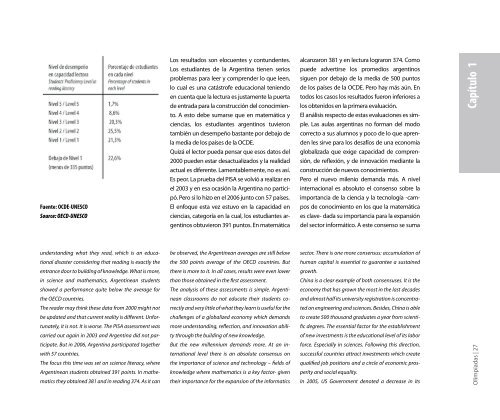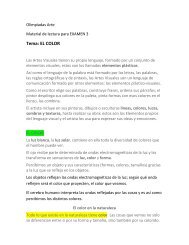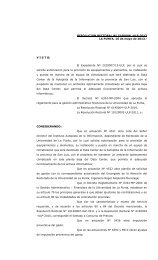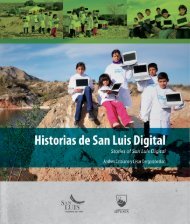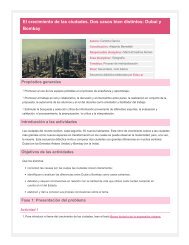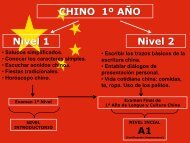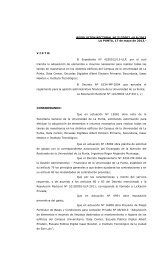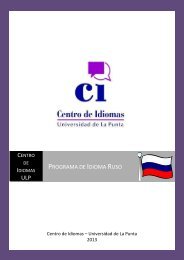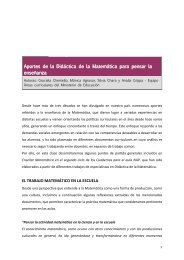ción para la Cooperación y el Desarrollo Económico (OCDE-UNESCO).<strong>La</strong>s evaluaciones <strong>de</strong>l PISA se realizan cada tres años y tienen como finalidad<strong>de</strong>terminar en qué medida los alumnos, que están próximos acompletar su educación escolar, han adquirido los conocimientos y habilida<strong>de</strong>sque necesitan para <strong>de</strong>senvolverse en la sociedad. Por este motivo,en las propuestas <strong>de</strong> evaluación el énfasis está en cómo se aplican losconocimientos en situaciones cotidianas <strong>de</strong>l mundo real. Se examina elrendimiento <strong>de</strong> alumnos <strong>de</strong> 15 años y se estudian también otros resultadoseducativos como la motivación por apren<strong>de</strong>r, la concepción que losestudiantes tienen sobre sí mismos y sus estrategias <strong>de</strong> aprendizaje.Para realizar las evaluaciones se tomaron muestras aleatorias, <strong>de</strong> escuelaspúblicas y privadas, en los distintos países que participaron. Dela Argentina se evaluaron 3983 chicos <strong>de</strong> 156 escuelas. En total participaron32 países, <strong>de</strong> los cuáles 28 eran parte <strong>de</strong> la OCDE.Se trabajó sobre tres habilida<strong>de</strong>s cognitivas: capacidad lectora, capacidadmatemática y capacidad en ciencias. Pero el foco <strong>de</strong> la pruebaestuvo puesto en la lectura. Se midió la capacidad para compren<strong>de</strong>r,interpretar, utilizar, extraer información y reflexionar sobre el contenido<strong>de</strong> una variedad <strong>de</strong> textos.En las tres capacida<strong>de</strong>s evaluadas, los países <strong>de</strong> la OCDE (países <strong>de</strong>sarrollados)obtuvieron resultados similares, con una media <strong>de</strong> 500puntos. <strong>La</strong> Argentina, al igual que otros países latinoamericanos, quedóbastante lejos <strong>de</strong> la media en los últimos puestos <strong>de</strong>l ranking. En capacidadlectora se obtuvieron 418 puntos, en capacidad matemática 388y en capacidad en ciencias 396.En la escala <strong>de</strong> aptitud <strong>de</strong> capacidad lectora, 5 fue el valor más alto.En ese se valor se agrupó a los alumnos capaces <strong>de</strong> manejar y criticarla información <strong>de</strong> los textos, compren<strong>de</strong>rlos, jerarquizar los datos,expresar una hipótesis y, en base a esas habilida<strong>de</strong>s, construir nuevosconocimientos. En el nivel 5, la Argentina agrupó sólo el 1,7 por ciento<strong>de</strong> sus participantes.Mientras que en el nivel por <strong>de</strong>bajo <strong>de</strong> 1, don<strong>de</strong> se ubican estudiantes congran<strong>de</strong>s dificulta<strong>de</strong>s para compren<strong>de</strong>r un texto y para utilizar la lecturacomo herramienta para apren<strong>de</strong>r, se concentró el 22,6 por ciento <strong>de</strong> losestudiantes. A lo que <strong>de</strong>be agregarse que entre los niveles más bajos <strong>de</strong> capacidadlectora, <strong>de</strong>s<strong>de</strong> menos 1 al nivel 3, la Argentina concentró el 89,7 porciento. Y en los niveles superiores, 4 y 5, concentró sólo el 10, por ciento.Olimpíadas | 26PISA assessments are carried out every three years andtheir objective is to <strong>de</strong>termine how far stu<strong>de</strong>nts nearthe end of compulsory education have acquired someof the knowledge and skills that are essential for fullparticipation in society. This is why, in the assessments’proposals the emphasis lies on how knowledge isapplied to daily situations of the real world. Fifteenyears-old stu<strong>de</strong>nts’ performance is studied as well asother educational results such as learning motivation,stu<strong>de</strong>nts’ self conception, and their learning strategies.So as to carry out assessments random samples weretaken from private and public schools in the differentcountries that participated. In Argentina 3983 childrenin 156 schools were assessed. A total of 32 countriesparticipated and 28 of them were part of the OECD.Evaluation was ma<strong>de</strong> on three cognitive skills: readingliteracy, mathematics literacy, and science literacy.But the focus of the test was placed on reading. Abilityto un<strong>de</strong>rstand, interpret, use, and extract informationand think about the content of a variety of texts wasmeasured.In the three skills assessed, OECD countries (<strong>de</strong>velopedcountries) achieved similar results, with an average of500 points. Argentina, as other <strong>La</strong>tin American countries,was left behind the average in the last positionsof the ranking. In reading literacy they obtained 418points, in mathematics literacy 388 and in scienceliteracy 396.In the proficiency level for reading literacy scale, 5 wasthe highest value. Within that value, stu<strong>de</strong>nts able tomanage and criticize texts’ information, un<strong>de</strong>rstandthem, hierarchize data, express a hypothesis and buildnew knowledge, were grouped. In level 5 Argentinaonly grouped 1,7 per cent of its participants.While in the level below 1, where we find stu<strong>de</strong>nts withhuge difficulties for the comprehension of a text andthe use of reading as a learning tool, 22,6 per cent ofthe stu<strong>de</strong>nts were concentrated. What is more, amongthe lowest levels of reading literacy, from below 1 tolevel 3, Argentina concentrated the 89,7 per cent. Andin higher levels, 4 and 5, it only concentrated the 10per cent.Results are eloquent and convincing. Stu<strong>de</strong>nts fromArgentina have serious problems for reading and
Fuente: OCDE-UNESCOSource: OECD-UNESCOLos resultados son elocuentes y contun<strong>de</strong>ntes.Los estudiantes <strong>de</strong> la Argentina tienen seriosproblemas para leer y compren<strong>de</strong>r lo que leen,lo cual es una catástrofe educacional teniendoen cuenta que la lectura es justamente la puerta<strong>de</strong> entrada para la construcción <strong>de</strong>l conocimiento.A esto <strong>de</strong>be sumarse que en matemática yciencias, los estudiantes argentinos tuvierontambién un <strong>de</strong>sempeño bastante por <strong>de</strong>bajo <strong>de</strong>la media <strong>de</strong> los países <strong>de</strong> la OCDE.Quizá el lector pueda pensar que esos datos <strong>de</strong>l2000 pue<strong>de</strong>n estar <strong>de</strong>sactualizados y la realidadactual es diferente. <strong>La</strong>mentablemente, no es así.Es peor. <strong>La</strong> prueba <strong>de</strong>l PISA se volvió a realizar enel 2003 y en esa ocasión la Argentina no participó.Pero si lo hizo en el 2006 junto con 57 países.El enfoque esta vez estuvo en la capacidad enciencias, categoría en la cual, los estudiantes argentinosobtuvieron 391 puntos. En matemáticaalcanzaron 381 y en lectura lograron 374. Comopue<strong>de</strong> advertirse los promedios argentinossiguen por <strong>de</strong>bajo <strong>de</strong> la media <strong>de</strong> 500 puntos<strong>de</strong> los países <strong>de</strong> la OCDE. Pero hay más aún. Entodos los casos los resultados fueron inferiores alos obtenidos en la primera evaluación.El análisis respecto <strong>de</strong> estas evaluaciones es simple.<strong>La</strong>s aulas argentinas no forman <strong>de</strong>l modocorrecto a sus alumnos y poco <strong>de</strong> lo que apren<strong>de</strong>nles sirve para los <strong>de</strong>safíos <strong>de</strong> una economíaglobalizada que exige capacidad <strong>de</strong> comprensión,<strong>de</strong> reflexión, y <strong>de</strong> innovación mediante laconstrucción <strong>de</strong> nuevos conocimientos.Pero el nuevo milenio <strong>de</strong>manda más. A nivelinternacional es absoluto el consenso sobre laimportancia <strong>de</strong> la ciencia y la tecnología -campos<strong>de</strong> conocimiento en los que la matemáticaes clave- dada su importancia para la expansión<strong>de</strong>l sector informático. A este consenso se sumaCapítulo 1un<strong>de</strong>rstanding what they read, which is an educationaldisaster consi<strong>de</strong>ring that reading is exactly theentrance door to building of knowledge. What is more,in science and mathematics, Argentinean stu<strong>de</strong>ntsshowed a performance quite below the average forthe OECD countries.The rea<strong>de</strong>r may think these data from 2000 might notbe updated and that current reality is different. Unfortunately,it is not. It is worse. The PISA assessment wascarried out again in 2003 and Argentina did not participate.But in 2006, Argentina participated togetherwith 57 countries.The focus this time was set on science literacy, whereArgentinean stu<strong>de</strong>nts obtained 391 points. In mathematicsthey obtained 381 and in reading 374. As it canbe observed, the Argentinean averages are still belowthe 500 points average of the OECD countries. Butthere is more to it. In all cases, results were even lowerthan those obtained in the first assessment.The analysis of these assessments is simple. Argentineanclassrooms do not educate their stu<strong>de</strong>nts correctlyand very little of what they learn is useful for thechallenges of a globalized economy which <strong>de</strong>mandsmore un<strong>de</strong>rstanding, reflection, and innovation abilitythrough the building of new knowledge.But the new millennium <strong>de</strong>mands more. At an internationallevel there is an absolute consensus onthe importance of science and technology – fields ofknowledge where mathematics is a key factor- giventheir importance for the expansion of the informaticssector. There is one more consensus: accumulation ofhuman capital is essential to guarantee a sustainedgrowth.China is a clear example of both consensuses. It is theeconomy that has grown the most in the last <strong>de</strong>ca<strong>de</strong>sand almost half its university registration is concentratedon engineering and sciences. Besi<strong>de</strong>s, China is ableto create 500 thousand graduates a year from scientific<strong>de</strong>grees. The essential factor for the establishmentof new investments is the educational level of its laborforce. Especially in sciences. Following this direction,successful countries attract investments which createqualified job positions and a circle of economic prosperityand social equality.In 2005, US Government <strong>de</strong>noted a <strong>de</strong>crease in itsOlimpíadas | 27
- Page 3 and 4: Olimpíadas Sanluiseñasdel Conocim
- Page 5: 57Introducción / IntroductionPról
- Page 13 and 14: crédito fiscal transferible para p
- Page 17: el coordinador de la materia elegid
- Page 20 and 21: la idea de un buscador, como modali
- Page 25: Hacia la Sociedad de la Informació
- Page 30 and 31: otro: la acumulación de capital hu
- Page 33 and 34: aquella incipiente industrializaci
- Page 35 and 36: Tecnológico: las acciones tienen c
- Page 37: el modo de cursado intensivo se gen
- Page 41 and 42: Olimpíadas: su trayectoria y su cr
- Page 43 and 44: za, Tilisarao, Villa Mercedes y el
- Page 45 and 46: certificados, las becas y las compu
- Page 47 and 48: emociones. Ni bien llegaron desde E
- Page 49 and 50: ordó de júbilo. La fiesta creció
- Page 51 and 52: diferentes países y sus culturas,
- Page 53: Anexo Capítulo 2
- Page 56 and 57: Olimpíadas | 54
- Page 58 and 59: RESOLUCIÓN RECTORAL N° 2290007-UL
- Page 60 and 61: ANEXO IREGLAMENTO GENERALARTICULO 1
- Page 62 and 63: solicitados del participante y hace
- Page 64 and 65: ARTICULO 5.3 - LAS EVALUACIONESLos
- Page 66 and 67: ecibirá medallas y becas. En el ca
- Page 68 and 69: Para el primer puesto de los grupos
- Page 70 and 71: La Punta. Tampoco podrán ser modif
- Page 72 and 73: conformidad con lo mencionado.Respe
- Page 74 and 75: Nómina de los ganadores:Ganadores
- Page 76 and 77: 3.Fabián Vilela, Escuela N° 9 Dom
- Page 78 and 79:
Literaria EGB 3 y polimodal1.Andrea
- Page 80 and 81:
Astronomía EGB 31°Tobares Marisel
- Page 82 and 83:
Ganadores olimpíadas 2008:Discipli
- Page 84 and 85:
Balladore FedericoNivel 1°,2° y 3
- Page 86:
Olimpíadas | 84Escuelas Ganadoras
- Page 91 and 92:
Olimpíadas Sanluiseñas delConocim
- Page 93 and 94:
1 de junioLa ULP inició las Olimp
- Page 95 and 96:
“Lanzamiento 2006”, reunión de
- Page 97 and 98:
1 de septiembre - Primerainstancia
- Page 99 and 100:
28 de octubre - Segundainstancia de
- Page 101 and 102:
Segunda instancia”, alumnos parti
- Page 103 and 104:
“Fiesta Olimpíadas 2006”, prem
- Page 105 and 106:
“Fiesta Olimpíadas 2006”, la f
- Page 107 and 108:
20 de diciembre - Visitas al sitio2
- Page 109 and 110:
“Viaje al CASLEO”, excursión a
- Page 111 and 112:
Viaje al CASLEO”, observaciones a
- Page 113 and 114:
Capítulo 3“Olimpíadas Sanluise
- Page 115 and 116:
“Etapa de evaluaciones”, alumno
- Page 117 and 118:
“Segunda instancia”, los alumno
- Page 119 and 120:
“San Luis Digital 2007”, Olimp
- Page 121 and 122:
“Fiesta Olimpíadas 2007”, mome
- Page 123 and 124:
“Fiesta Olimpíadas 2007”, la f
- Page 125 and 126:
15 de diciembre - 3000 chicospartic
- Page 127 and 128:
2008Los ganadores de las Olimpíada
- Page 129 and 130:
Capítulo 3“Viaje a la NASA”, l
- Page 131 and 132:
“Viaje a la NASA”, los chicos e
- Page 133 and 134:
“Viaje a la NASA”, los chicos e
- Page 135 and 136:
Capítulo 3“Viaje a la NASA”, n
- Page 137 and 138:
13 de febrero- Viaje al CASLEOLos c
- Page 139 and 140:
3 de marzo - Comenzaron lasOlimpía
- Page 141 and 142:
“Olimpíadas 2008”, notas perio
- Page 143 and 144:
“Primera instancia”, alumnos en
- Page 145 and 146:
“Segunda instancia”, los alumno
- Page 147 and 148:
Capítulo 3“Olimpíadas en San Lu
- Page 149 and 150:
Capítulo 3“Olimpíadas en San Lu
- Page 151 and 152:
Capítulo 3“Olimpíadas 2008”,
- Page 153 and 154:
Capítulo 3“Olimpíadas 2008”,
- Page 155 and 156:
“Fiesta Olimpíadas 2008”, la f
- Page 157 and 158:
Capítulo 3“Fiesta Olimpíadas 20
- Page 159 and 160:
Capítulo 3“Fiesta Olimpíadas 20
- Page 161 and 162:
Capítulo 3“Fiesta Olimpíadas 20
- Page 163 and 164:
16 de diciembre - Números ULP5200
- Page 165 and 166:
Olimpíadas | 163Capítulo 3
- Page 167 and 168:
“Viaje a la NASA”, los chicos e
- Page 169 and 170:
Capítulo 3“Viaje a la NASA”, l
- Page 171 and 172:
Capítulo 3“Viaje a la NASA”, n
- Page 173 and 174:
Capítulo 3“Viaje a Buenos Aires
- Page 175 and 176:
“Viaje a Buenos Aires”, una ave
- Page 177 and 178:
Capítulo 3“Viaje a Buenos Aires
- Page 181:
El presenteCapítulo 4
- Page 184:
Asimismo la ULP está mejorando las


